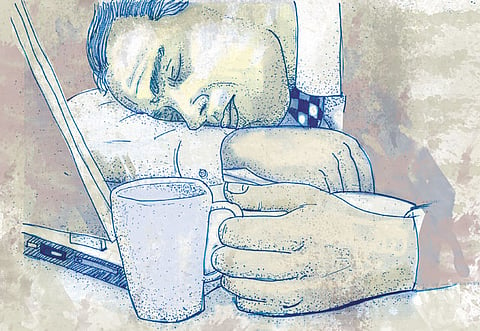Workaholics in the UAE
In UAE the disorder takes on a new dimension and the adage 'survival of the fittest' is more pronounced

Dubai: In the UAE and Dubai in particular, working 12 to 14 hours at a stretch is common in some private sector companies, and a psychiatrist says he gets many cases of people complaining of depression and anxiety.
"Some people love their jobs and enjoy working long hours," says Professor Adnan A. Fadli, consultant at Al Rashad Psychiatry Clinic.
However, he believes this is not always the case in the emirates.
"They are working hard just to keep their jobs," he says, adding that many patients he sees complain of peptic ulcers, migraines and high blood pressure.
Emotional toll
The psychiatrist says there is also a huge emotional toll on workaholics in the emirates. "They lose contact with their families," he says.
According to another psychiatrist, some people become workaholics because they are incompetent.
"These people never take leave," says Dr N.K. Dhar, psychiatrist at the Jumeirah Prime Medical Centre. "They don't give time to their families. They don't spend time with their children."
"Most often the realisation occurs (that something is wrong) when their supporting system crashes," adds Sailaja Menon, psychologist at the Dubai Community Health centre.
"When a marriage falls apart, when children suffer and there is a breakdown in social relationships."
The psychologist believes that workaholism is considered a "respectable addiction" and a workaholic does not believe overworking is a problem.
While the divorce rate among Emiratis is high, there are no statistics about expatriate marriages unravelling here.
Expatriates
But according to a lawyer, divorce among expatriates is also high and anecdotal evidence suggests that it maybe because of the supercharged lifestyle here.
Dr Dhar says workaholics here are also spurred on by the temptation to make a lot of money.
"You have to provide for your children's education. There is a family back home to take care of. The demands are more on these people," he says.
He believes there are various other reasons for overworking, including personality traits.
"Work becomes an obsession like an obsessive compulsive disorder. Others may have a bad boss who makes them work long hours.
"Some companies attach incentives to work more and more."
On the other hand, incompetent people work longer hours, he says.
"The don't even take leave because of their insecurity."
Workaholics tend to smoke more, drink more, eat more and gain weight, said the doctor. Obesity then leads to other chronic ailments.
Menon feels that when you move from your home country to make a livelihood to provide for yourself and for your loved ones back home, the constant state of pressure can put expatriates in a frame of mind to work harder and longer shifts.
"They have to demonstrate loyalty and commitment to rise up the ladder in their jobs and earn better salaries to support themselves and their families."
She says that over a period of time this mindset can lead to that person becoming a workaholic.
- In Japan, workaholism is called ‘karoshi', death by overwork. A proportion of the population dies of heart attacks due to slaving long hours at work.
- In the Netherlands, it is called the ‘leisure Illness', because people cannot relax when they are not working, however hard they try. Workaholism affects some people because of cultural characteristics.
- "The Japanese had to rebuild their country after the Second World War," said Professor Adnan A Fadli, consultant at Al Rashad Psychiatry Clinic.
- Working long hours became ingrained in their psyche. Suicide and alcoholism rates in Japan are the highest in the world.
Have your say
Do you think being a workaholic is a serious problem? How does it affect one’s life? Would you stay up all night to finish work? Or would you leave it for the next day? Tell us.



